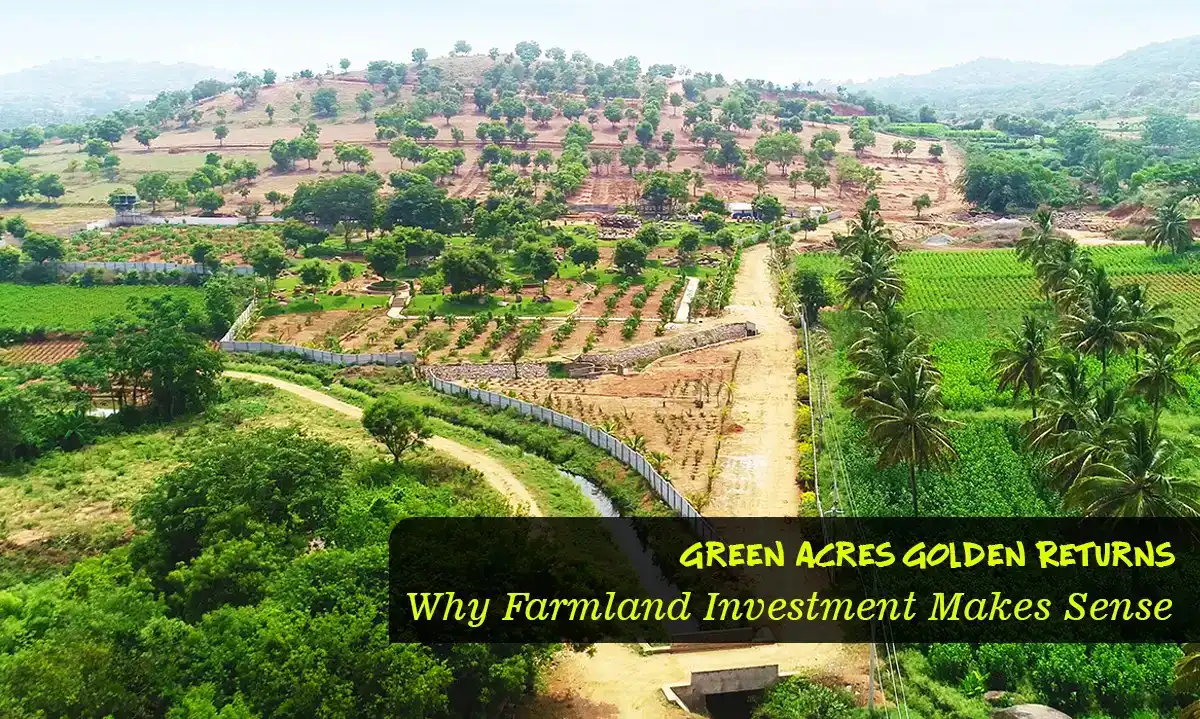Green Acres, Golden Returns: Why Farmland Investment Makes Sense

Farmland is becoming a more appealing option for investors seeking real, tried-and-true assets in an uncertain environment of financial instability and market turbulence. For good reason, the idea of investing in agricultural property has been gaining popularity. According to a proverb, "Buy land, they're not making it anymore." We'll look at the rationale behind farmland investing in this blog, as well as why it's starting to appeal to those looking for both stability and wealth.
The Resilience of Agriculture
The foundation of human civilization is agriculture, which has shown itself to be resilient over the ages. The need for food, fuel, and fiber is rising as the world's population continues to rise. Investing in farmland capitalizes on the ongoing need for agriculture, which makes it a dependable asset type.
Steady Income Stream
The possibility of a reliable source of income is one of the main arguments in favor of investing in farming. Crop production, animal grazing, or even land leasing are some of the ways that farmland creates revenue, in contrast to other assets that are vulnerable to market instability. Agricultural fields yield a consistent crop of returns, frequently notwithstanding shifts in the economy.
Tangible Asset
A physical asset having intrinsic worth is farmland. Purchasing farmland entitles you to the ownership of a plot of land, a resource that has been valued for ages. You can visit your investment, feel the soil, and watch your asset in action—unlike with stocks and bonds.
Diversification Benefits
Diversifying your portfolio of investments is a tried-and-true way to lower risk and boost returns. Considering that farmland often behaves differently than traditional financial assets, it is an attractive option for diversification.
Low Correlation with Equities
Investments in farms have a lower correlation with stocks, thus their return tends to follow its own trajectory. Farmland's value may be steady throughout market crashes or economic downturns. This low correlation might be a useful protective measure against volatility in the stock market.
Inflation Hedge
In the past, agricultural land has served as an inflation hedge. The value of goods produced on farms increases along with the cost of living. The yearly revenue flow from farming operations as well as the possible value of the property itself might be advantageous to investors.
Long-Term Appreciation
Investing in farmland can result in long-term appreciation in addition to immediate revenue. Due to the limited supply of arable land and other variables like urbanization and population expansion, the value of agricultural land tends to rise with time.
Population Growth
The demand for food and agricultural goods is rising as the world's population continues to climb. This fuels the need for more farming and drives up the price of land. Purchasing farmland puts you in a position to profit from this rising demand.
Urbanization
Cities are becoming more and more populated, encroaching on rural land and converting it into urban development. Your agricultural investment may increase in value as a result of rising land values brought on by a potential shortage of arable landd
Environmental and Ethical Considerations
Investing in farms may support ethical and environmental ideals in addition to financial gains. The concept of encouraging sustainable agriculture and prudent land management appeals to a lot of investors.
Sustainable Agriculture
In addition to being good for the environment, sustainable farming methods may increase farmland's long-term production and worth. You may support and participate in environmentally sustainable agriculture techniques by purchasing farmland.
Ethical Land Stewardship
The investors can ensure that their farmland supports biodiversity, soil health, and wildlife protection by having a keen eye toward ethical land stewardship. This can increase the financial appeal of agriculture from an ethical and environmental perspective.
Accessibility and Flexibility
Investing in agricultural farmland doesn’t stop only the large-scale investors or agri-specialists. This form of investment is very feasible for laymen who are interested in agriculture. With brands such as Getfarms, they have a wide range of farmlands tailored to fit everyone’s budget.
Different Investment Scales
Investment in farmland may be customized to fit your budget. Depending on your investment objectives and budget, you can invest in a single acre or many hundred. Your portfolio may be customized and diversified thanks to this flexibility.
Professional Management
There are reputable farm management businesses, like Getfarms, that can take care of the day-to-day management of your property if you don't have the necessary agricultural experience or don't want to manage the land yourself. This way, investors may profit from owning farmland without having to get their hands dirty.
Risks to Consider
While farmland investment offers numerous advantages, it's essential to be aware of potential risks:
Market Variability
Your farmland returns can be affected by various factors such as market movements, commodity pricing, and weather. A proper risk management plan must be practiced to avoid such hindrances.
Land Management
The success of agricultural investments depends on efficient land management. Hiring seasoned farm managers may assist in guaranteeing profitable operations and efficient use of the land.
Putting it all up, farmland investment is becoming more and more recognized as a wise financial decision due to its durability, advantages for diversification, possibility for long-term growth, and compatibility with moral and ethical principles.Investing in farmlandpresents a special chance to increase your wealth while assisting a vital aspect of human existence, regardless of your level of expertise with investing or knowledge of the agricultural industry. Thus, think of the green acres as your golden returns and confidently enter the agricultural investing market.
Latest Blog
JOIN OUR COMMUNITY !
Stay connected with Getfarms! Follow us on social media for the latest updates, exclusive offers, and a glimpse into the world of farmhouse living. Join our community today




























